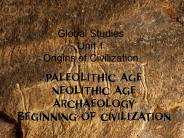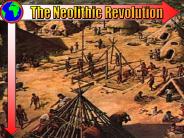Huyuk PowerPoint PPT Presentations
All Time
Recommended
Lungshan people located in present-day _, _BC. Ur, located in present-day _BC ... Anyang, located in present-day China, 1,750-1,045 BC ...
| PowerPoint PPT presentation | free to view
Creation of Patriarchy. World Population: 1000 BCE to Present. World Population, ... The Venus of Willendorf. Mother Goddess Image. Mother Goddess: Catal Huyuk ...
| PowerPoint PPT presentation | free to view
Title: Neolithic 9000-4000 BC Catal Huyuk Mesopotamia a. Uruk 3500-3100 bc- Uruk Modern Iraq b. Sumer- Early dynastic period : Ur, Tell Asmar,Sumer c ...
| PowerPoint PPT presentation | free to view
Pottery and metal work. Massive stone arrangements. Dolmens/Passage graves ... Pottery. DES381-Fall2009. DES381-Fall2009. Chatal Huyuk. DES381-Fall2009. DES381 ...
| PowerPoint PPT presentation | free to view
... cave birth to the belief in a single god chosen ruler in the Middle East ... Middle East ... urban centers in the Middle East were: Jericho, and Catal Huyuk ...
| PowerPoint PPT presentation | free to view
East African Man. Lucy. Homo Habilis. Homo Erectus. Neanderthal Man. Cro-Magnon Man. Jericho. Catal Huyuk. Otzi, the Iceman ...
| PowerPoint PPT presentation | free to view
Paleolithic and Neolithic World History SOL WHI.2a,b,c,d Essential Questions How did physical geography influence the lives of early humans? What were the ...
| PowerPoint PPT presentation | free to download
Title: PowerPoint Presentation Author: Evan Williams Last modified by: Karla Williams Created Date: 7/17/2004 2:19:55 AM Document presentation format
| PowerPoint PPT presentation | free to view
001 STONE AGE PALEOLITHIC NEOLITHIC ANATOLIAN PLANE NEOLITHIC ARCHITECTURE Symbolism, ritual and magic Megalithic Great Stone Large Post and Beam Small ...
| PowerPoint PPT presentation | free to view
Title: 001 STONE AGE Author: KMurphy Last modified by: wmurphy0004 Created Date: 8/25/2005 3:18:06 PM Document presentation format: On-screen Show (4:3)
| PowerPoint PPT presentation | free to view
Title: 001 STONE AGE Author: KMurphy Last modified by: wmurphy0004 Created Date: 8/25/2005 3:18:06 PM Document presentation format: On-screen Show (4:3)
| PowerPoint PPT presentation | free to view
Improvements in agriculture, production, trade and transportation Neolithic Era Pottery pottery Handmade Usually monochrome Shapes were few Decoration (where it ...
| PowerPoint PPT presentation | free to download
Early Humans Chapter 1, Section 1 History The story of humans in the past Anthropologist Studies human society Studies how humans developed Archaeologist Studies ...
| PowerPoint PPT presentation | free to view
Title: Paleolithic and Neolithic Revolutions Author: Technology Last modified by: user Created Date: 6/14/2005 3:34:59 PM Document presentation format
| PowerPoint PPT presentation | free to download
Title: Pre-History and Ancient Civilizations Author: orm16385 Last modified by: Philip Kroeger Created Date: 8/11/2003 3:11:54 PM Document presentation format
| PowerPoint PPT presentation | free to download
Early Human History ... Life in Paleolithic Age ... Civic 6_Civic 7_Civic 8_Civic 9_Civic 10_Civic 11_Civic Early Human History I. The Stone Age I ...
| PowerPoint PPT presentation | free to download
Period 1 Timeline to 600 B.C.E. c. 10000 B.C.E.: Neolithic Revolution c. 600 C.E. Nok in West Africa smelt iron c. 4000 B.C.E. discovery of metal tools
| PowerPoint PPT presentation | free to download
Paleolithic Period-Old Stone Age-the period from 2.5 million B.C. to around 8000 B.C. During this time man mastered fire, created stone tools, ...
| PowerPoint PPT presentation | free to download
Ch. 1 Notes Emergence of Civilization
| PowerPoint PPT presentation | free to view
The Neolithic Revolution (Began around 10K B.C.E.) Origins of Agriculture Neolithic- New Stone Age ... Origins of Agriculture Neolithic- New Stone Age ...
| PowerPoint PPT presentation | free to download
Welcome to Western Civilization
| PowerPoint PPT presentation | free to view
BEFORE HISTORY Paleolithic To Neolithic K.M.H.S. AP World History
| PowerPoint PPT presentation | free to download
Civilization What makes a civilization? Are YOU civilized ? * artisan * migration * Ice Age * Hunt and Gather * domestication 5 Characteristics of a Civilization ...
| PowerPoint PPT presentation | free to download
The Earth and Its Peoples Part I The Emergence of Human Communities to 500 BC A. Origins of Agriculture 1st River Valley Civs (8000BC 1500BC)
| PowerPoint PPT presentation | free to download
Bell Work Use the timeline on 24-25 to answer the following questions About when did the first modern humans appear in Africa? When did the Ice Ages end?
| PowerPoint PPT presentation | free to view
... Declaration 1917 Palestinian refugee camp West Bank Jewish settlements West Bank settlements Intifada Kibbutzes Cyprus Kurds Oil! Ghawar Oil Field Palm Island, ...
| PowerPoint PPT presentation | free to download
Neolithic Times New Stone Age New Stone Age About 8000 B.C. people started producing food This brought about a great change in the way people lived Farming The ...
| PowerPoint PPT presentation | free to download
CHAPTER 1 THE PEOPLING OF THE WORLD Prehistory 2500 B.C.
| PowerPoint PPT presentation | free to download
Urban Design & Planning Tom Turner University of Greenwich School of Architecture and Construction 0208 331 9100 Email t.turner@gre.ac.uk Website www ...
| PowerPoint PPT presentation | free to view
Geography Sensational Sumer Important People Chain of Civilization Early Humans History s Detectives Key Vocabulary Potpourri 100 100 100 100 100 100 100 100
| PowerPoint PPT presentation | free to download
Chapter 2 Beginning of Civilzation The Neolithic Age
| PowerPoint PPT presentation | free to download
Period 1 Notes To 600 B.C.E.. Technological and Environmental Transformations Paleolithic Era During Paleolithic Era, hunter-gatherer early humans migrated from ...
| PowerPoint PPT presentation | free to download
How did Sargon the Great earn a place in our history books? The conquerors were the Akkadians, who lived to the north. They were not as technologically advanced as ...
| PowerPoint PPT presentation | free to view
Title: No Slide Title Author: Administrator Last modified by: chansen Created Date: 12/1/2004 2:27:18 AM Document presentation format: On-screen Show (4:3)
| PowerPoint PPT presentation | free to download
... period in history when everything was made from stone or wood Long period of time in the history of mankind 2.3 million years ago to 8000 years ago Paleolithic ...
| PowerPoint PPT presentation | free to download
Early Human History Paleolithic art from Lascaux, France. I. ... depended on hunting animals and collecting foods Humans evolved to what we are today: ...
| PowerPoint PPT presentation | free to download
The Origin of Humans
| PowerPoint PPT presentation | free to view
Greyhounds in History There is much speculation as to the origin of the name Greyhound It may stem from the word gazehound , which is another word for ...
| PowerPoint PPT presentation | free to download
Around 3,000 BCE, cities began to pop up. These cities could NOT have come about without agriculture. Before agriculture, what method did humans use to get food?
| PowerPoint PPT presentation | free to download
THE NEOLITHIC AGE The Neolithic Revolution-Brief Review 1) Hunting and Gathering - Human origins to Paleolithic ( Old Stone Age ) 2) Use of Wild Grains ...
| PowerPoint PPT presentation | free to view
Title: The Origin of Humans Author: Susan M. Pojer Last modified by: Windows User Created Date: 7/19/2002 12:43:49 AM Document presentation format
| PowerPoint PPT presentation | free to download
Humans Try to Control Nature KEY IDEA: Humans began to grow food and raise animals. Their population increased, and they began to live in settled communities.
| PowerPoint PPT presentation | free to view
Title: Slide 1 Author: Kara burns Last modified by: Banny Ackerman Created Date: 8/29/2006 4:02:49 PM Document presentation format: On-screen Show Other titles
| PowerPoint PPT presentation | free to view
Cambiamento del rapporto uomo-natura Passaggio alla vita sedentaria Nascita dell agricoltura Nascita dell allevamento ... nuova classe sociale legata all ...
| PowerPoint PPT presentation | free to download
Human Prehistory Early humans to the Neolithic revolution
| PowerPoint PPT presentation | free to view
The earliest part of the Stone Age is called the Paleolithic period. Paleolithic people were nomads, traveling from place to place to hunt and search for food.
| PowerPoint PPT presentation | free to download
Chapter 1 Section 2: The Beginning of Agriculture Main Idea The development of agriculture was a major turning point in human history and significantly changed the ...
| PowerPoint PPT presentation | free to view
FIRST RIVER VALLEY CIVILIZATIONS PRE-CIVILIZATION Stability due to need to control water Small groups could not regulate waters Small groups could not defend area ...
| PowerPoint PPT presentation | free to download
Between 60,000-15,000 YA Homo sapiens spread throughout the world Bering Land Bridge open to foot travel between 60,000 15,000 years ago Human populations moved ...
| PowerPoint PPT presentation | free to download
Chapter 1 Notes Human Beginnings Discovery of Early Americans Important Terms to Know: Prehistory = period of time before people developed writing Hominids ...
| PowerPoint PPT presentation | free to download
Title: La Preistoria La rivoluzione Neolitica Author. Last modified by: f.toscano Created Date: 10/16/2002 5:01:28 PM Document presentation format
| PowerPoint PPT presentation | free to download
AP WORLD HISTORY Power Review Session 1 Early Civilizations (Pre-History to 600 BCE)
| PowerPoint PPT presentation | free to view
chapter 1 first river valley civilizations
| PowerPoint PPT presentation | free to view
Nomads- hunter-gatherers -Paleolithic Age. Farming- Planting crops/ slash and burn ... Movie clip Chapter 1. Civilization, Section 3. pgs. 19-23 ...
| PowerPoint PPT presentation | free to view
The Neolithic Revolution (8000BCE-3500BCE) Sometimes termed the Agricultural Revolution. Humans begin to slowly domesticate plant and animal stocks in Southwest Asia.
| PowerPoint PPT presentation | free to download
The Emergence of Cities and States Chapter 1.3 A. Introduction: Farming generated more complex societies As settlements grew, people began to see themselves as part ...
| PowerPoint PPT presentation | free to download
























































